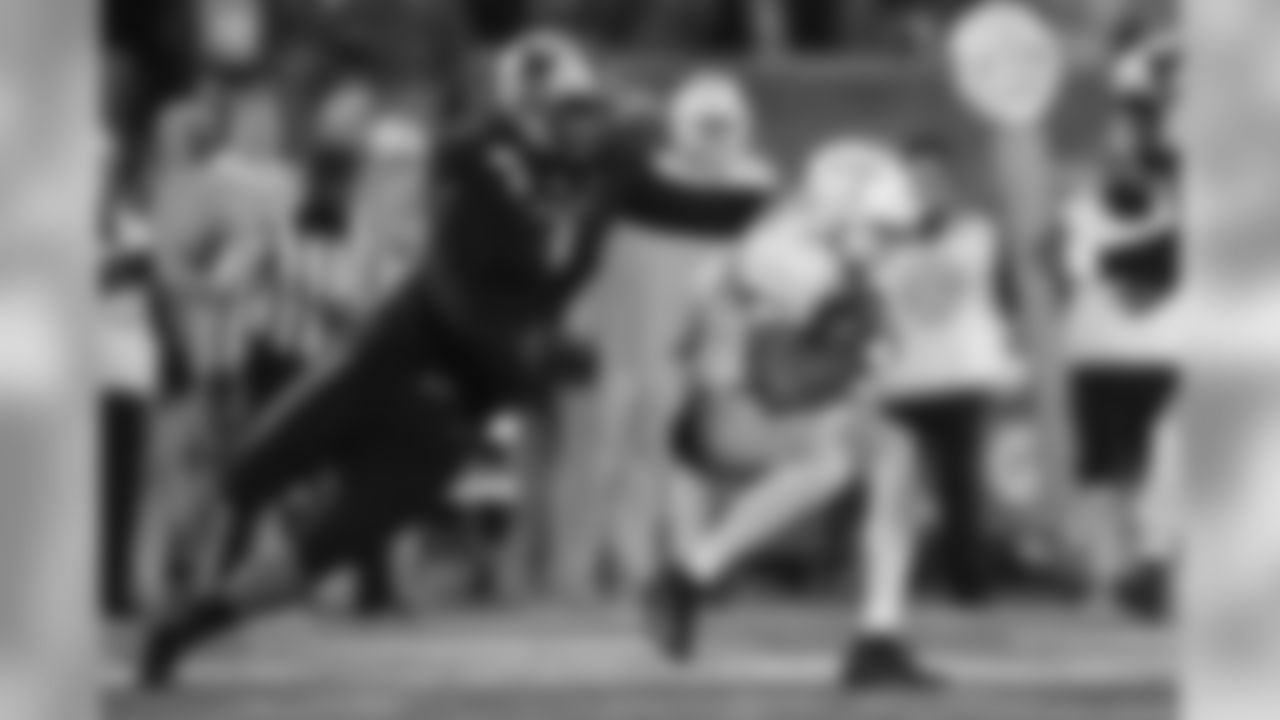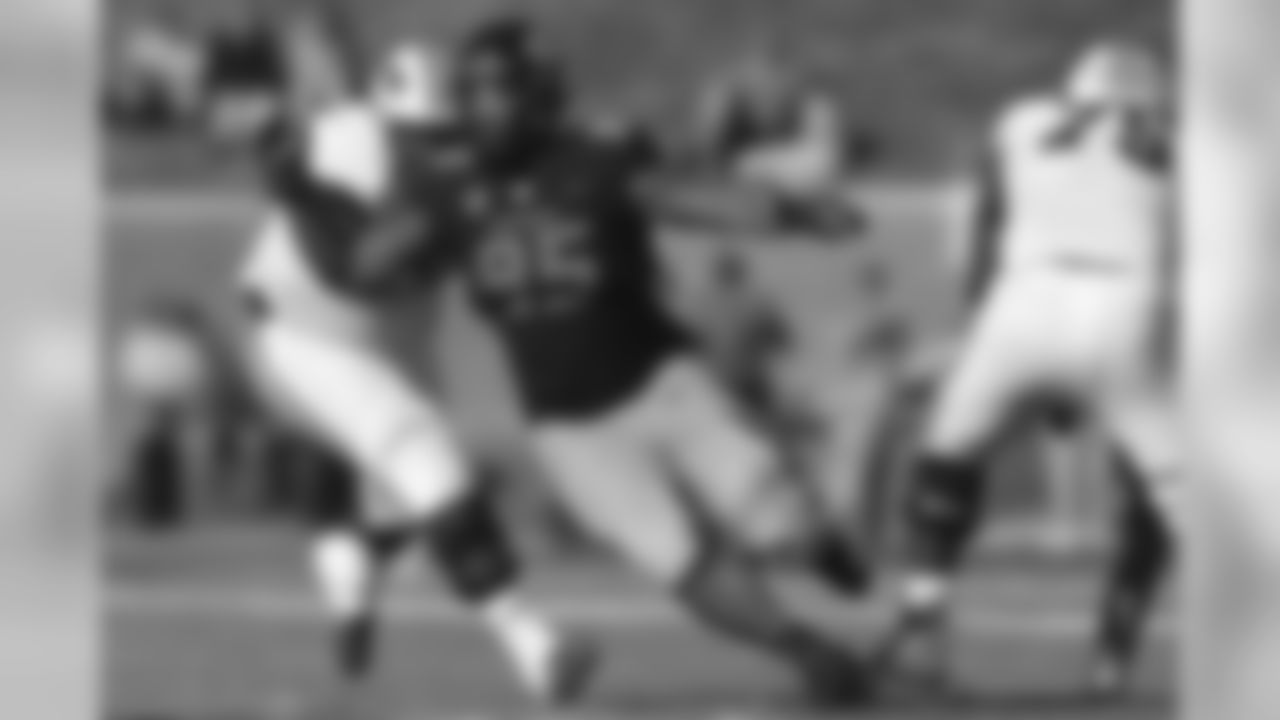When KhaDarel Hodge woke up on June 7, grabbed his phone and scrolled through Instagram, the idea hit him.
Hodge was swiping through photos of friends participating in social justice protests, supporting black-owned businesses and showing their support for the movement to eliminate racial injustice when he found the perfect way to continue contributing to the local black community.
Hodge, who's preparing for his second season as a Browns wide receiver from his offseason home in Houston, wanted to invite some guests to begin a daily routine of eating at black-owned restaurants and have a conversation about anything related to black lives in America. It was a fun and productive way to enjoy delicious food, meet new people and brainstorm ideas about improving the lives of black American citizens.
"I've been paying attention to what's been going on in the world, and I figured I should try to make a difference somehow," said Hodge, who also participated in one of Houston's peaceful protests following the May 25 death of George Floyd in Minneapolis police custody. "I've been seeing everything trending about supporting black businesses, and I love to go out to eat. That was something I wanted to do, and I also wanted to give people that opportunity to enjoy it with me.
Hodge wanted to invite some guests to begin a daily routine of eating at black-owned restaurants and have a conversation about anything related to black lives in America. It was a fun and productive way to enjoy delicious food, meet new people and brainstorm ideas about improving the lives of black American citizens.
Hodge's restaurant journey started with a few friends he knew from Prairie View A&M, a historically black university and Hodge's alma mater. The meal was soul-food based — a blend of beans, greens, cornmeal and pork — and eaten over a conversation that went beyond reminiscing over college memories.
"Browns Live: Meet the Rookies" presented by MANCAN will take your knowledge to another level. Hosted by Nathan Zegura, the interactive live show will feature interviews with all seven members of the class, in-depth analysis and plenty of opportunities for fans to have their questions answered by the players themselves. Check out photos of the guests!

Offensive tackle Jedrick Wills Jr. (71)

Safety Grant Delpit (22)

Defensive tackle Jordan Elliott (61)

Linebacker Jacob Phillips (50)

Tight end Harrison Bryant (88)

Center Nick Harris (53)

Wide receiver Donovan Peoples-Jones (11)

Punter Jamie Gillan (7)

Offensive tackle Jedrick Wills Jr. (71)

Safety Grant Delpit (22)

Defensive tackle Jordan Elliott (61)

Linebacker Jacob Phillips (50)

Tight end Harrison Bryant (88)

Center Nick Harris (53)

Wide receiver Donovan Peoples-Jones (11)

Punter Jamie Gillan (7)

Offensive tackle Jedrick Wills Jr. (71)

Safety Grant Delpit (22)

Defensive tackle Jordan Elliott (61)

Linebacker Jacob Phillips (50)

Tight end Harrison Bryant (88)

Center Nick Harris (53)

Wide receiver Donovan Peoples-Jones (11)

Punter Jamie Gillan (7)

Offensive tackle Jedrick Wills Jr. (71)

Safety Grant Delpit (22)

Defensive tackle Jordan Elliott (61)

Linebacker Jacob Phillips (50)

Tight end Harrison Bryant (88)

Center Nick Harris (53)

Wide receiver Donovan Peoples-Jones (11)

Punter Jamie Gillan (7)

Offensive tackle Jedrick Wills Jr. (71)

Safety Grant Delpit (22)

Defensive tackle Jordan Elliott (61)

Linebacker Jacob Phillips (50)

Tight end Harrison Bryant (88)

Center Nick Harris (53)

Wide receiver Donovan Peoples-Jones (11)

Punter Jamie Gillan (7)
The group also discussed the importance of continued support of black-owned businesses and restaurants, many of which are looking to financially recover from the shutdowns caused by the COVID-19 pandemic. Houston has a rich history of black-owned restaurants, and it was the perfect place for Hodge to embark on his mission.
"KhaDarel has always been that guy who wants to help other people," said Shawn Pierce, who joined Hodge at Lucille's and was his former teammate at Prairie View. "He's always wanted to shine his light on others. This has always been important to him, so it didn't surprise me that he wanted to use his platform to support other people."
Hodge opened his mission to anyone who saw his posts on Instagram, where people could recommend a new restaurant and receive an invite from Hodge, and the check is always on him.
In the past two weeks, Hodge has taken over a dozen guests to more than five restaurants, and the meals have ranged from soul food to tacos to hamburgers — whatever appeals to Hodge's appetite that afternoon.
"Whenever I go, I post it on Instagram and tell people to pull up," Hodge said. "If you say you want to come, then I just say, 'Be at this place at this time.' Everything is on me. The only thing you have to do is show up."
The meals, however, are secondary to the main goal Hodge has in his food journey. It's about supporting black-owned business and starting a conversation about how he and his guests can help black Americans ride an equal path to success.
One of the ideas Hodge wants to pursue is starting an education program for underprivileged black children. Through his conversations with guests, Hodge has adopted a deeper understanding of the obstacles many black students battle when they graduate high school and face important career choices.
For many of those students, a return home could lead to involvement in gangs, criminal activity and a significantly more difficult path to a healthy lifestyle.
The idea was just one solution Hodge has pieced together in his talks with guests, many of whom also attended Prairie View.
"We talked about how that could be a good opportunity for kids who are less fortunate and to have the same opportunities, like KhaDarel, who had scholarships to play football in college," said Kiana Perkins, who went with Hodge to Phil and Derek's Restaurant. "He was mentioning programs that instill skills such as focusing on sports, but also encouraging their schooling and offering tutoring.
"I think KhaDarel would be perfect for a position like that because he has so much influence. He loves children, and to watch him come up with an idea that he could actually implement was amazing."
Hodge has encouraged other guests to begin similar missions as his restaurant tour. Cameron Lavergne, who was with Hodge at Lucille's, spent last weekend shopping exclusively at black-owned businesses after dining with Hodge. She believes other people in the Houston area will see Hodge's work and begin a similar plan themselves.
"I think he helped start a trend," Lavergne said. "We're seeing this influence, especially in Houston, of many people supporting black-owned restaurants. I definitely think he's done a great job of supporting the movement in that way."
Hodge's work is precisely what Browns coach Kevin Stefanski has encouraged from his players. Since protests began around the country, several of the Browns' virtual meetings have focused away from football and contained discussions about how the team can use their platform to inspire change.
Stefanski, who attended a protest in Avon two weeks ago, told his players to "get in the arena" and be active in their communities.
"I think that's big," Hodge said. "He actually took the time out to stop talking about installs and stop talking about football, period, and just focus on the outside world. Him talking about it and speaking from his heart means a lot. He's been going to protests himself, and that means a lot to not only me, but the team. It shows where his heart really is."
Hodge doesn't have an end date for his mission, but he doesn't need one. His work has already inspired people to take another step forward in how active they are in supporting the elimination of systemic racism. His restaurant visits have encouraged free conversations about how everyone at the table can make a difference.
The good food has simply been an added bonus.
"It's just about learning and seeing where people come from," Hodge said. "To be at the level they're at right now is just a blessing. It's heart-warming, for the most part. It's good to hear how they're doing and how special they are right now. That was really the main part, just getting to know people, networking and getting out of the house."














